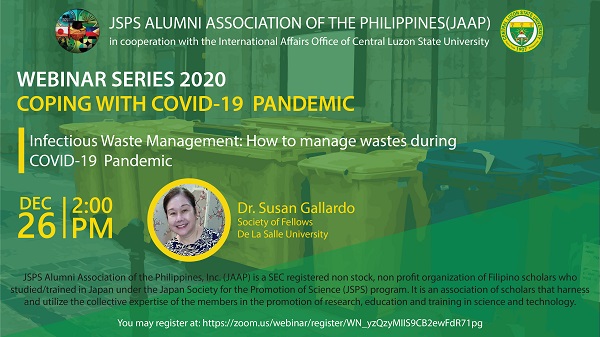On 19 December 2020, the 4th lecture of WEBINAR SERIES 2020 “COPING WITH COVID-19 PANDEMIC”, was held by JSPS Alumni Association of the Philippines (JAAP) in cooperation with the International Affairs Office of Central Luzon State University.
The lecture was opened by a welcome address by Dr. Danilda Hufana-Duran, President of JAAP.
After the welcome address by Dr. Edgar A. Orden, President of Central Luzon State University and Dr. Yoshio Otani, Director of JSPS Bangkok Office gave short messages.
Then, Dr. Susan M. Gallardo, Society of Fellows De La Salle University made a presentation entitled “Infectious Waste Management: How to manage wastes during COVID-19 Pandemic.”
For this lecture, about 60 participants attended and many questions were raised after the presentation. Especially the moderator Dr. C. Deocaris mentioned that JAAP should lead Philippines government in this field and there are many chances to start new businesses.
Finally, Dr. Rowena Eguia, Vice President of JAAP delivered closing remarks, thanking everyone involved in this seminar.
【Abstract of the Lecture】
Health-care waste includes all the waste generated by health-care establishments, research facilities, and laboratories. 10-25% of health-care waste is regarded as hazardous and may create a variety of health risks. Infectious waste is waste suspected to contain pathogens (bacteria, viruses, parasites, or fungi) in sufficient concentration or quantity to cause disease in susceptible hosts.
The main legislation of the Philippine government with regards to hazardous waste management is RA 6969. It is otherwise known as “Toxic Substances and Hazardous and Nuclear Waste Control Act of 1990”. The law was enacted to protect the public and the environment from the risk or potential dangers in the use or exposure to chemicals, from long- term damage brought about by careless handling or disposal of hazardous wastes; and to regulate the use, movement and disposal of chemicals, hazardous and nuclear wastes in the country.
The COVID-19 pandemic is continuing to have an impact on the country’s healthcare system as well as in waste management system. There are increased volumes of discarded materials from health protection activities, medical diagnosis, treatment and scientific research. Safe and efficient disposal of this medical waste is a critical component of a comprehensive response effort.
How the government and the private sector (healthcare facilities) have responded to these challenges is discussed in this lecture. The Environment Management Bureau (EMB) of the Department of Environment and Natural Resources (DENR) has issued several Memorandum Circulars to facilitate the on-line registration of generators, transporters, storage, treatment and disposal facilities.
Lastly, partial results of a survey on the healthcare facility’s infectious waste management before and during COVID-19 Pandemic will be included.










